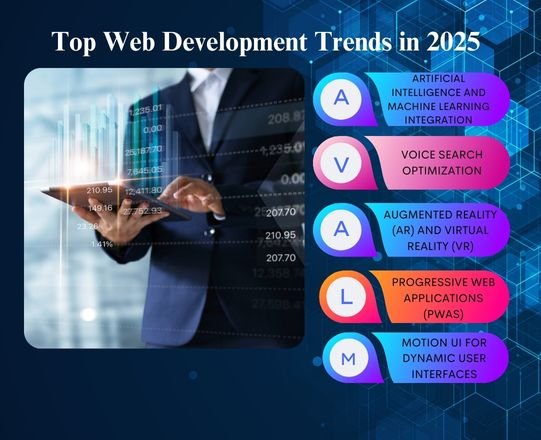
As we move into
2025, new technologies and trends are transforming how websites are built,
optimized, and experienced. From AI-driven automation to progressive web
applications, businesses and developers must stay ahead of the curve to remain competitive.
In this blog, we’ll explore the top web development trends in 2025 that will redefine
online experiences.
1.
Artificial intelligence and machine learning integration: AI and ML are transforming web
development by enabling personalized user experiences, predictive analytics,
and intelligent content creation. Implementing AI-driven chatbots and
recommendation engines helps to enhance user engagement and satisfaction.
2. Voice search
optimization: With the
increasing use of voice-activated assistants, optimizing websites for voice
search is becoming important. This involves focusing on natural language
processing and ensuring content is structured to answer conversational queries
effectively.
3. Augmented
reality (AR) and virtual reality (VR): Incorporating AR and VR into websites offers immersive
experiences that can make businesses stand out. For example, virtual try-ons
for makeup products or interactive 3D tours for real estate provide users with
a better connection to products and services.
4.
Progressive web applications (PWAs): PWAs
combine the best features of web and mobile applications, offering offline
capabilities, quick loading times, and a native app-like experience. They are
cost-effective and enhance user engagement across various devices.
6. Motion UI
for dynamic user interfaces: Motion
UI involves using animations and transitions to create engaging and intuitive
user interfaces. It helps guide users through a website, highlight important
elements and improve overall user experience.
7. Single page
applications (SPAs): SPAs
load a single HTML page and dynamically update content as users interact with
the app. This approach offers a more fluid and responsive user experience,
similar to that of desktop applications.
8.
Serverless architecture: Serverless
computing allows developers to build and run applications without managing
server infrastructure. This leads to reduced costs, improved scalability, and
faster deployment times.
9. API-first
development: An
API-first approach ensures that the application programming interface is a
foundational component of development. This strategy promotes better
integration, faster development and deployment, scalability, and flexibility
across platforms and devices.
Conclusion
Are you ready
to embrace the future of web development? We at Mitiz
Technologies, help you
to stay ahead of your competitors by implementing modern design trends and
technologies. Our experts make web development faster, smarter, and more
efficient, helping you create future-ready websites that offer exceptional digital
experiences.